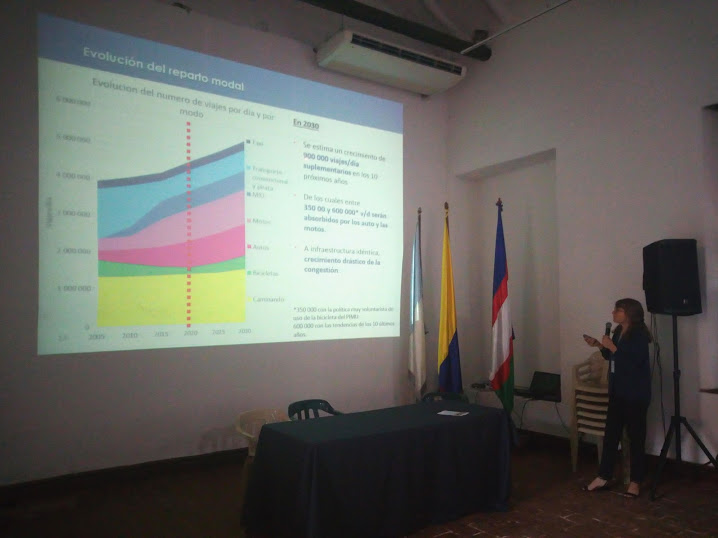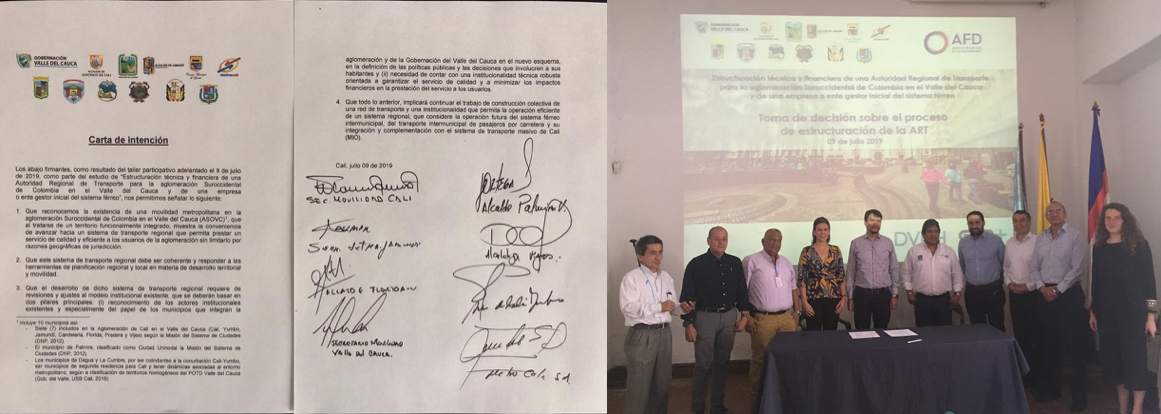Technical cooperation in Colombia : closing the first stage of the cooperation
In February, CODATU launched a technical cooperation in Cali, Colombia, on metropolitan governance of public transport. In partnership with the French Development Agency AFD (through FEXTE funding), the cooperation aims to support local authorities in the implementation of a « Regional Transport Authority » (RTA) in the metropolitan area of Cali. The cooperation is part of a broader context of strategic mobility projects for the region currently in development supported by the French Embassy in Colombia and the AFD through FASEP and FFEM funding : the local train linking Cali and the neighboring municipalities (the project is currently in prefeasability stage, conducted by SYSTRA) and the « Corredor Verde » project which promotes soft mobilities and urban renovation alongside the railway in Cali.
The Franco-Colombian consulting group DVDH-GSD+ conduces the structuration study of Cali Regional Transport Authority. The consulting project will last 8 months and will define the institutional, organizational, financial and technical components of the Regional Transport Authority (RTA) and the entity in charge of implementing the regional train project.
Second workshop of the technical cooperation: scenarios of structuration of the RTA.
 Codatu first workshop took place in May of 2019. It allowed local and national institutions to think together about the potential role, functions, functioning and impact of implementing a RTA in Cali metropolitan area. In July, DVDH-GSD+ organized a second workshop which aimed at sharing the results of their diagnosis and present different possible schemes for structuring the RTA with local stakeholders.
Codatu first workshop took place in May of 2019. It allowed local and national institutions to think together about the potential role, functions, functioning and impact of implementing a RTA in Cali metropolitan area. In July, DVDH-GSD+ organized a second workshop which aimed at sharing the results of their diagnosis and present different possible schemes for structuring the RTA with local stakeholders.
The necessity of creating such institution appears clearly in the conclusions of the diagnosis :
- Vehicle traffic could increase up to 40% in the next decade, which confirms the emergency of developing collective and non-motorized systems of transportation in the region and reduce the share of private vehicles circulating in the city
- Mobility is expensive, both for users of public and private modes of transportation and for private operators. A reorganization of the system regionally is necessary to optimize costs.
- The regional system is very centralized which generate high levels of congestion in the nuclear city of Cali.
- There are strong institutions with technical capacities and relevant experience in the region which must be regarded as assets and serve as pillars for the new organization
- The legal framework is little developed and allows for flexibility, which will support the development of a system relevant to local necessities
Afterwards, participants collectively imagined the future regional transport network through a collective mapping exercise. They imagined a network composed of the future train, an expanded BRT system connecting neighboring cities to Cali, waterway transportation on the Cauca river and a reorganization of intermunicipal lines toward circumferential routes which connect the different cities without entering Cali.

Collective mapping, DVDH-GSD+ workshop, Cali 2019
This regional integrated system was framed as the goal to achieve in the next years. The RTA must be the institution that will allow for the construction of such regional network. Based on the presentation of 6 case studies (Sao Paulo, Porto, Lyon, Bogotá, Medellín and Kochi), the participants were allowed to evaluate the best scenario of structuration of the RTA given local conditions and necessities. Two guidelines emerged. First, municipalities must be politically represented in the decision-making body of the RTA. Second, the best option is to create a single technical entity to implement and operate Cali massive system of transportation (BRT), the future train and interurban bus lines. These guidelines will shape the structuring exercise of the consultants.
Strategic institutional alignment
 Interviews with Cali Director of Mobility and the Mayor of Florida
Interviews with Cali Director of Mobility and the Mayor of Florida
DVDH, GSD+ and Codatu realized interviews with local decision-makers (Mayors, Heads of Municipal Transportation Departments, President of MetroCali) in order to gauge the political will of implementing the train and RTA projects. General enthusiasm was shown by all local stakeholders interviewed. Indeed, these projects represent a great opportunity for regional development and they should answer to some of the most pressing mobility issues (high accident rate in the region, competition of private and irregular modes of transportation, unsustainability of public municipal systems, traffic congestion in Cali, etc.).
To formalize their strategic alignment, public decision-makers signed a letter of intent at the end of the workshop.
 Political leaders of Yumbo, Jamundi, Vijes, Florida, Palmira, Cali, Valle del Cauca and MetroCali signed a letter of intent.
Political leaders of Yumbo, Jamundi, Vijes, Florida, Palmira, Cali, Valle del Cauca and MetroCali signed a letter of intent.
Next steps
The mission of DVDH-GSD+ in Cali closed the first step of the cooperation, defining general guidelines on the future RTA and formalizing the institutional endorsement of the project.
In septembre, the third workshop will take place organized by Codatu, DVDH and GSD+. It will aim at including all the stakeholders involved in public transportation (private companies and users) and define a roadmap for the implementation of the future metropolitan system of transportation and its institutional framework.
Download the report of the first semester (in spanish): Codatu_Actividades_primer_semestre
